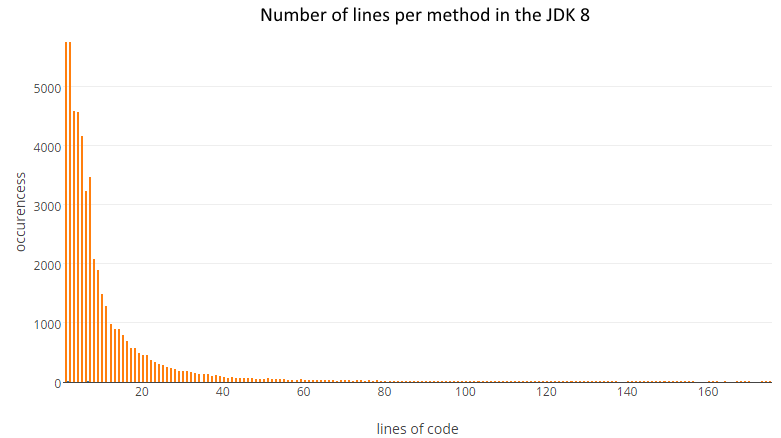The JDK itself can help us to count the lines of code, we just need to parse the source and get the method bodies in a String representation–then we can count the lines. A quick statistic from the new Java 8 Stream API will give us the numbers.
Code first:
import java.io.IOException;
import java.nio.file.FileVisitResult;
import java.nio.file.Files;
import java.nio.file.Path;
import java.nio.file.Paths;
import java.nio.file.SimpleFileVisitor;
import java.nio.file.attribute.BasicFileAttributes;
import java.util.*;
import javax.tools.JavaCompiler;
import javax.tools.JavaCompiler.CompilationTask;
import javax.tools.StandardJavaFileManager;
import javax.tools.ToolProvider;
import com.sun.source.tree.CompilationUnitTree;
import com.sun.source.tree.MethodTree;
import com.sun.source.util.JavacTask;
import com.sun.source.util.TreeScanner;
public class AverageNumberOfLinesInJDKFinder {
public static void main( String[] args ) throws IOException {
String[] files = findAllJavaSourceFiles( "C:/Program Files/Java/jdk1.8.0/src/" );
JavaCompiler compiler = ToolProvider.getSystemJavaCompiler();
try ( StandardJavaFileManager fileManager = compiler.getStandardFileManager( null, null, null ) ) {
CompilationTask task = compiler.getTask( null, fileManager, null, null, null,
fileManager.getJavaFileObjects( files ) );
JavacTask javacTask = (JavacTask) task;
Iterable<? extends CompilationUnitTree> trees = javacTask.parse();
LineCountingVisitor lineCountingVisitor = new LineCountingVisitor();
for ( CompilationUnitTree compilationUnitTree : trees )
compilationUnitTree.accept( lineCountingVisitor, null );
DoubleSummaryStatistics stats = lineCountingVisitor.numberOfLines.stream().mapToDouble( d -> d ).summaryStatistics();
System.out.println( stats );
}
}
static String[] findAllJavaSourceFiles( String base ) throws IOException {
final List<String> result = new ArrayList<String>();
Files.walkFileTree( Paths.get( base ), new SimpleFileVisitor<Path>() {
@Override
public FileVisitResult visitFile( Path path, BasicFileAttributes attribs ) {
if ( path.toString().endsWith( ".java" ) )
result.add( path.toString() );
return FileVisitResult.CONTINUE;
}
} );
return result.toArray( new String[result.size()] );
}
}
class LineCountingVisitor extends TreeScanner<Void, Void> {
final List<Integer> numberOfLines = new ArrayList<Integer>( 2048 );
@Override
public Void visitMethod( MethodTree node, Void p ) {
if ( node.getBody() != null ) {
int lines = new StringTokenizer( node.getBody().toString(), "\n" ).countTokens() - 1 /* { */ - 1 /* } */;
if ( lines != 0 ) // ignore empty bodies
numberOfLines.add( lines );
}
return super.visitMethod( node, p );
}
}
Result:
DoubleSummaryStatistics{count=84695, sum=576427,000000, min=1,000000, average=6,805915, max=1716,000000}
Exercise for the readers:
- Analyse different open source products and post the results here.
- Generate a SVG with the lines of code.
- Change the calculation so we not only get the arithmetic mean but also the geometric and harmonic mean.
- Sort the result by package, are there differences?
- Recognize the @since Javadoc tag and try to find out if the number of lines change over time.
- How about the line size?


Das ist ja mal eine nette Fingerübung 🙂 Sehr schön gemacht.